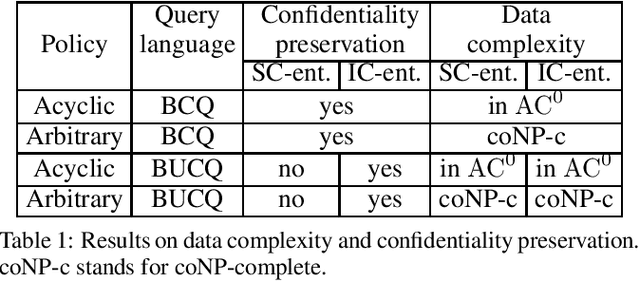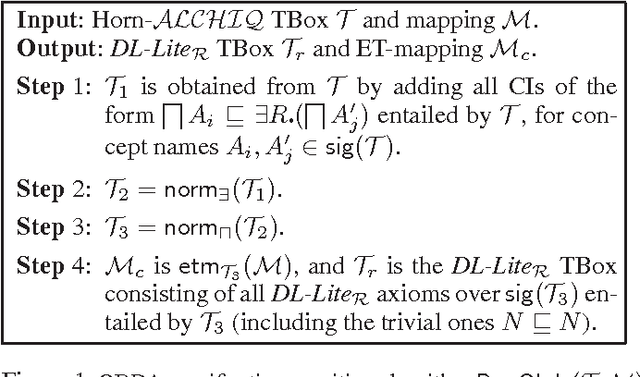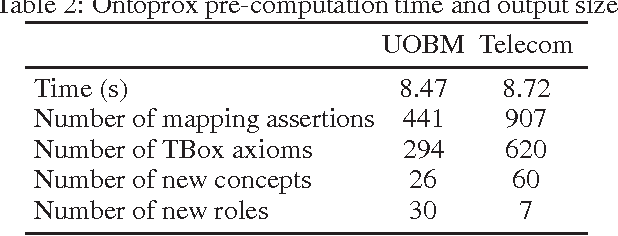Domenico Fabio Savo
Università degli Studi di Bergamo
Controlled Query Evaluation through Epistemic Dependencies
May 03, 2024
Abstract:In this paper, we propose the use of epistemic dependencies to express data protection policies in Controlled Query Evaluation (CQE), which is a form of confidentiality-preserving query answering over ontologies and databases. The resulting policy language goes significantly beyond those proposed in the literature on CQE so far, allowing for very rich and practically interesting forms of data protection rules. We show the expressive abilities of our framework and study the data complexity of CQE for (unions of) conjunctive queries when ontologies are specified in the Description Logic DL-Lite_R. Interestingly, while we show that the problem is in general intractable, we prove tractability for the case of acyclic epistemic dependencies by providing a suitable query rewriting algorithm. The latter result paves the way towards the implementation and practical application of this new approach to CQE.
CQE in OWL 2 QL: A "Longest Honeymoon" Approach
Jul 22, 2022Abstract:Controlled Query Evaluation (CQE) has been recently studied in the context of Semantic Web ontologies. The goal of CQE is concealing some query answers so as to prevent external users from inferring confidential information. In general, there exist multiple, mutually incomparable ways of concealing answers, and previous CQE approaches choose in advance which answers are visible and which are not. In this paper, instead, we study a dynamic CQE method, namely, we propose to alter the answer to the current query based on the evaluation of previous ones. We aim at a system that, besides being able to protect confidential data, is maximally cooperative, which intuitively means that it answers affirmatively to as many queries as possible; it achieves this goal by delaying answer modifications as much as possible. We also show that the behavior we get cannot be intensionally simulated through a static approach, independent of query history. Interestingly, for OWL 2 QL ontologies and policy expressed through denials, query evaluation under our semantics is first-order rewritable, and thus in AC0 in data complexity. This paves the way for the development of practical algorithms, which we also preliminarily discuss in the paper.
CQE in Description Logics Through Instance Indistinguishability (extended version)
Apr 24, 2020Abstract:We study privacy-preserving query answering in Description Logics (DLs). Specifically, we consider the approach of controlled query evaluation (CQE) based on the notion of instance indistinguishability. We derive data complexity results for query answering over DL-Lite$_{\mathcal{R}}$ ontologies, through a comparison with an alternative, existing confidentiality-preserving approach to CQE. Finally, we identify a semantically well-founded notion of approximated query answering for CQE, and prove that, for DL-Lite$_{\mathcal{R}}$ ontologies, this form of CQE is tractable with respect to data complexity and is first-order rewritable, i.e., it is always reducible to the evaluation of a first-order query over the data instance.
Beyond OWL 2 QL in OBDA: Rewritings and Approximations
Dec 01, 2015


Abstract:Ontology-based data access (OBDA) is a novel paradigm facilitating access to relational data, realized by linking data sources to an ontology by means of declarative mappings. DL-Lite_R, which is the logic underpinning the W3C ontology language OWL 2 QL and the current language of choice for OBDA, has been designed with the goal of delegating query answering to the underlying database engine, and thus is restricted in expressive power. E.g., it does not allow one to express disjunctive information, and any form of recursion on the data. The aim of this paper is to overcome these limitations of DL-Lite_R, and extend OBDA to more expressive ontology languages, while still leveraging the underlying relational technology for query answering. We achieve this by relying on two well-known mechanisms, namely conservative rewriting and approximation, but significantly extend their practical impact by bringing into the picture the mapping, an essential component of OBDA. Specifically, we develop techniques to rewrite OBDA specifications with an expressive ontology to "equivalent" ones with a DL-Lite_R ontology, if possible, and to approximate them otherwise. We do so by exploiting the high expressive power of the mapping layer to capture part of the domain semantics of rich ontology languages. We have implemented our techniques in the prototype system OntoProx, making use of the state-of-the-art OBDA system Ontop and the query answering system Clipper, and we have shown their feasibility and effectiveness with experiments on synthetic and real-world data.
On the evolution of the instance level of DL-lite knowledge bases
Apr 20, 2011Abstract:Recent papers address the issue of updating the instance level of knowledge bases expressed in Description Logic following a model-based approach. One of the outcomes of these papers is that the result of updating a knowledge base K is generally not expressible in the Description Logic used to express K. In this paper we introduce a formula-based approach to this problem, by revisiting some research work on formula-based updates developed in the '80s, in particular the WIDTIO (When In Doubt, Throw It Out) approach. We show that our operator enjoys desirable properties, including that both insertions and deletions according to such operator can be expressed in the DL used for the original KB. Also, we present polynomial time algorithms for the evolution of the instance level knowledge bases expressed in the most expressive Description Logics of the DL-lite family.
 Add to Chrome
Add to Chrome Add to Firefox
Add to Firefox Add to Edge
Add to Edge